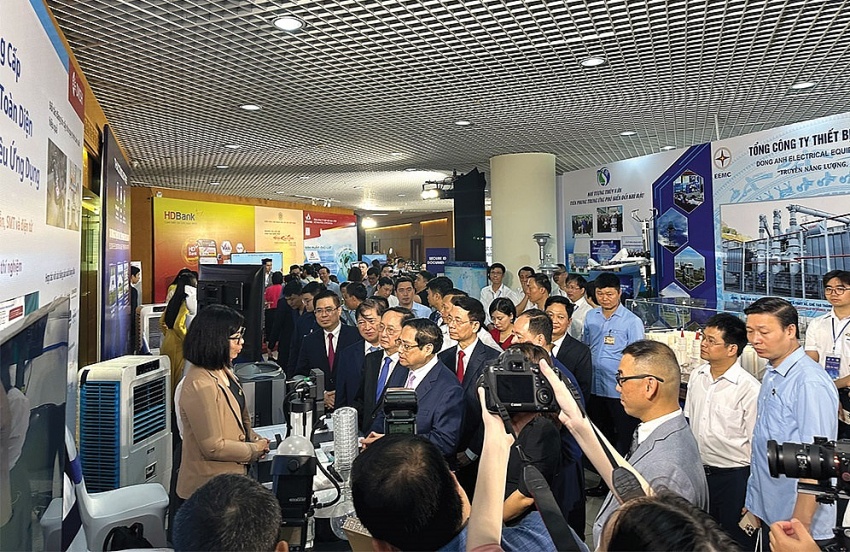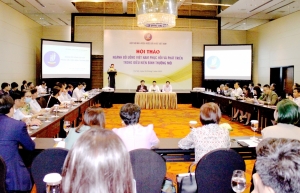Businesses seek sci-tech rule changes
The Ministry of Science and Technology (MoST) is working on amendments to the 2013 Law on Science and Technology (LoST) towards creating further refinements for businesses and intellectuals.
 |
| PM Pham Minh Chinh (centre) has reiterated that sci-tech is fundamental to the green-digital transition |
“The ministry will drastically amend the law with many new points, transforming it into an effective tool and important legal corridor to strongly promote science, technology, and innovation, with technology transfer and financial mechanisms being among the amendments,” said Nguyen Hoang Giang, Deputy Minister of Science and Technology.
The MoST’s plan is reinforced by the government’s determination to create a more enabling environment for the sci-tech sector. At a meeting to celebrate Vietnam Science and Technology Day on May 16, Prime Minister Pham Minh Chinh proclaimed that sci-tech and innovation are a fundamental element of both digital and green transformation.
“Science, technology, and innovation are the shortest path to achieving our goals. Therefore, we need to prioritise resources in institutions, mechanisms, policies, infrastructure, and people,” he noted. “Lessons from successful cases around the world, especially in South Korea, Japan, China, the United States, Germany, and Finland prove the great role of sci-tech in the development and advancement of nations.”
He requested relevant authorities to further promote the role of science and technology and innovation in all fields, considering this an important political task of all levels. They must focus on key tasks and solutions, such as building policies for inclusive development, investing in infrastructure, improving the quality of human resources, and increasing attraction and diversification.
Also of note to carry out includes strengthening the model of public-private partnerships, and having appropriate policies to lure reputable Vietnamese and international scientists to contribute to domestic sci-tech development.
At the meeting, Pham Van Tai, general director of business corporation THACO, said, “The business community looks forward to support from the MoST to create new advantages for businesses to participate in research, development, and application of sci-tech and innovation.”
It is regarded that the sci-tech industry is still facing many issues in terms of legal problems, human resources, limited state funding, and a big sci-tech gap with developed countries. The business community is waiting for improvements not only in the LoST, but also the Law on Capital City for Hanoi.
As shown in MoST statistics, investment in sci-tech has been decreasing compared to the level stated in the LoST. While investment must be no less than 2 per cent of the total annual state budget expenditure, in 2023 the state funding for sci-tech was only 0.82 per cent.
Nguyen Quan, chairman of the Vietnam Automation Association, which represents the voice of more than 1,000 member businesses, said that a major problem involves technology transfer, especially transferring research results to businesses.
“As shown in existing rules, when a research project is funded by the state budget, the result is owned by the state. Moreover, if research results are transferred, it is necessary to evaluate the product as intellectual property - a type of intangible asset,” Quan said.
“But currently, there is no competent agency assigned to evaluate assets and almost no-one dares to value them for transfer to businesses,” Quan continued.
He added that research projects also encounter difficulties in disbursement, payments, invoices, contracts, and bidding for equipment and materials procurement. Although financial management under the fund mechanism has been regulated in the sci-tech law, it has not yet been accepted for application to the relevant task management system.
“Along with amending the LoST, it is necessary to pay attention to amending laws on the state budget, corporate income tax, and on public employees to have a consistent legal system,” Quan added. “In addition, other laws such as on public procurement, public investment, use of public assets, and tech transfer must also be amended to remove obstacles in research activities, application, and commercialisation.”
 | Businesses seek stable tax policies for sustainable recovery in new normal Beverage businesses are calling for no tax increase to support them in the recovery path ahead, thus enabling them to develop more sustainably and contribute more to socioeconomic development. |
 | Rule revival a hitch for foreign firms The expiration of a resolution that assisted enterprises through the worst of the pandemic has created a knock-on effect on foreign investment activities in Vietnam, with representative offices among the entities affected as the old rules come back into play. |
What the stars mean:
★ Poor ★ ★ Promising ★★★ Good ★★★★ Very good ★★★★★ Exceptional
Related Contents
Latest News
More News
- State corporations poised to drive 2026 growth (February 03, 2026 | 13:58)
- Why high-tech talent will define Vietnam’s growth (February 02, 2026 | 10:47)
- FMCG resilience amid varying storms (February 02, 2026 | 10:00)
- Customs reforms strengthen business confidence, support trade growth (February 01, 2026 | 08:20)
- Vietnam and US to launch sixth trade negotiation round (January 30, 2026 | 15:19)
- Digital publishing emerges as key growth driver in Vietnam (January 30, 2026 | 10:59)
- EVN signs key contract for Tri An hydropower expansion (January 30, 2026 | 10:57)
- Vietnam to lead trade growth in ASEAN (January 29, 2026 | 15:08)
- Carlsberg Vietnam delivers Lunar New Year support in central region (January 28, 2026 | 17:19)
- TikTok penalised $35,000 in Vietnam for consumer protection violations (January 28, 2026 | 17:15)

 Tag:
Tag:




















 Mobile Version
Mobile Version